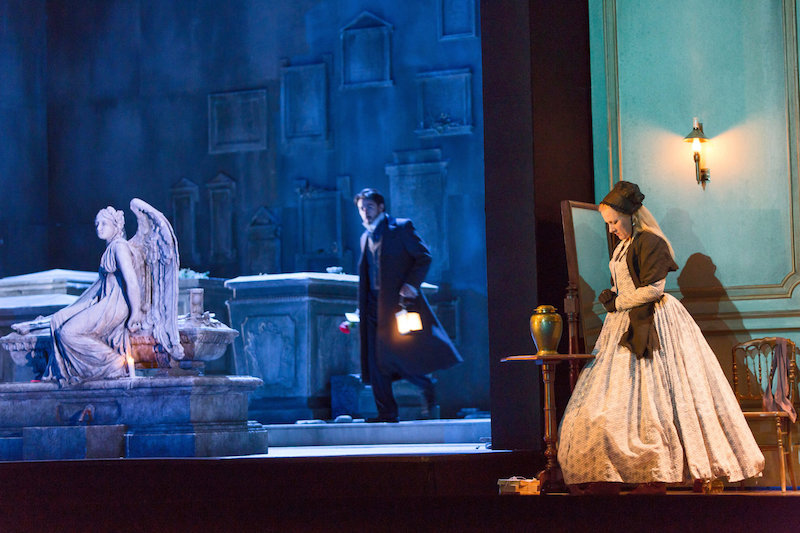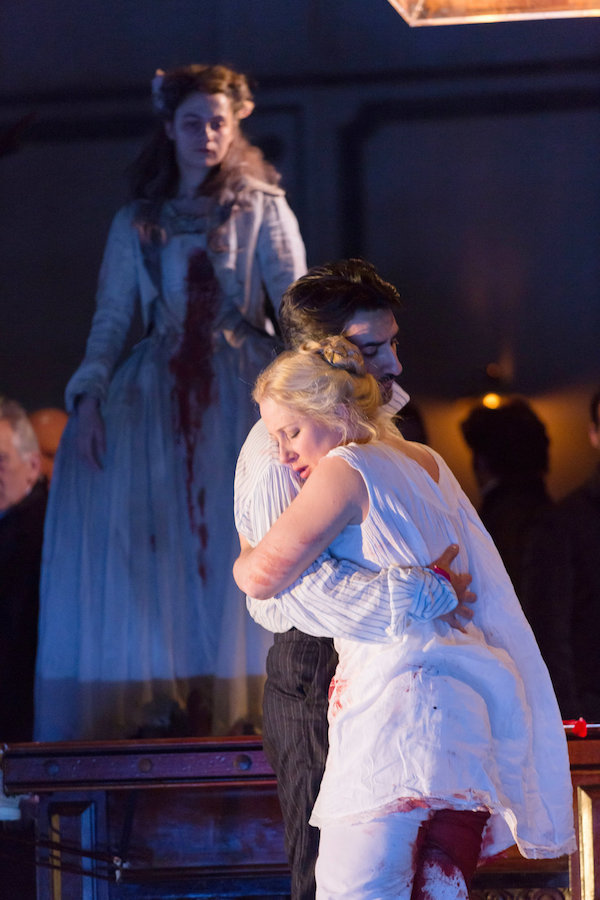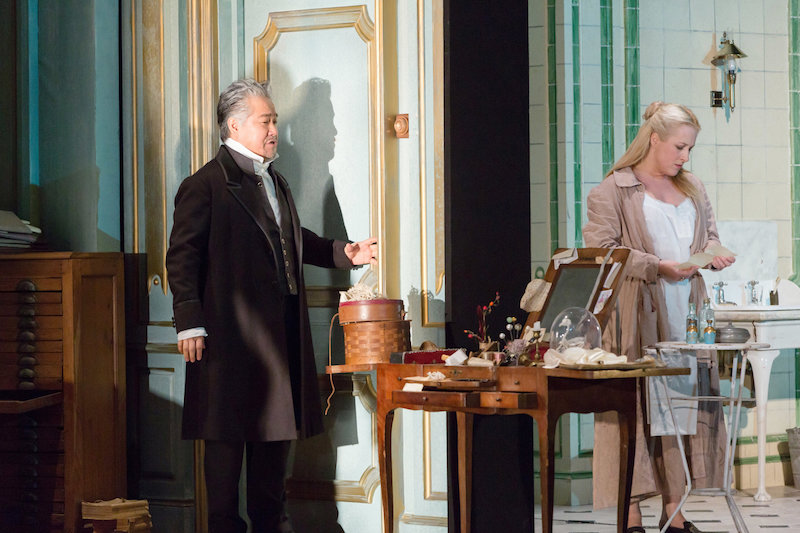Lucia di Lammermoor is an opera in which men spend an awful lot of time talking about women, and very little actually talking to them. (Which, if nothing else, ensures a rather more dramatic denouement than a frank conversation about everyone’s hopes and dreams would produce.) Enter director Katie Mitchell and her “strong feminist agenda”, determined to give Donizetti’s women back their voices, and with them the agency every plot twist in the opera conspires to deny. If the result is by no means a classic production, neither is it the all-out assault on tradition and decency the Royal Opera’s recent warnings of sex and violence led us to believe.
Rather than throwing out the familiar fixtures and fittings of this Gothic tragedy, Mitchell simply appropriates them, redirecting our focus, realigning our perspective, rather than reimagining from scratch. Instead of releasing her characters into the outdoor landscapes of Wolf’s Crag, the castle’s park and gardens – home to men at work and play – she cages them in a feminine world of interior spaces. They may move from bedroom to bathroom, to drawing room and mausoleum, but are always enclosed, entrapped.
 Then she splits the stage in half. Two playing spaces run concurrently throughout, juxtaposing Donizetti’s action with the opera’s “offstage” narrative. Lucia’s story – the deceptions of her secret affair with Edgardo, her relationship with her servant Alisa, her endless dressings and undressings, and, of course, the murder of her husband Arturo – all happen in full view. It’s meticulous psychological stuff, beautifully framed in Vicki Mortimer’s elegant 1830s designs. The trouble is that it’s all happening at the same time as the men swear vengeance, plot alliances and plan duels – action crucial to establishing and developing the characters of the majority of the (male) cast.
Then she splits the stage in half. Two playing spaces run concurrently throughout, juxtaposing Donizetti’s action with the opera’s “offstage” narrative. Lucia’s story – the deceptions of her secret affair with Edgardo, her relationship with her servant Alisa, her endless dressings and undressings, and, of course, the murder of her husband Arturo – all happen in full view. It’s meticulous psychological stuff, beautifully framed in Vicki Mortimer’s elegant 1830s designs. The trouble is that it’s all happening at the same time as the men swear vengeance, plot alliances and plan duels – action crucial to establishing and developing the characters of the majority of the (male) cast.
By creating straw men of her villains and her hero, Mitchell detracts from the genuine potency of her women. This is a Lucia charged with complicated, grown-up emotions. Her middle-aged Lucia (Diana Damrau, pictured above with Charles Castronovo) has a stature and a character lacking in her classic teenage counterpart, and the alternative narrative offered here by her sex with Edgardo in Act I, followed by pregnancy and the miscarriage which prompts the mad scene, makes contemporary sense of the opera’s weaker sequence of events. Even substituting an active, onstage suicide (bathtub, razor blade) for Lucia’s traditionally non-specific offstage expiry is an innovation that feels natural – the equal and opposite reaction to the brutally protracted and discomfiting murder scene, pre-meditated by the anything-but-mad heroine.
 But it’s all complicated by direction that clutters a strong, simple concept with too many details. There’s confusion between the naturalism of the emotional drama and sets, and the symbolism of the action. The constant invasion of private, female space by male characters works on a symbolic level but jars in the context of such naturalistic interactions. Would a Victorian brother (however villainous) really burst into his sister’s bathroom? Would a Victorian woman really stride about in her shift with male servants watching? Would a shy suitor really accost his beloved in her bedroom?
But it’s all complicated by direction that clutters a strong, simple concept with too many details. There’s confusion between the naturalism of the emotional drama and sets, and the symbolism of the action. The constant invasion of private, female space by male characters works on a symbolic level but jars in the context of such naturalistic interactions. Would a Victorian brother (however villainous) really burst into his sister’s bathroom? Would a Victorian woman really stride about in her shift with male servants watching? Would a shy suitor really accost his beloved in her bedroom?
And then there are the constant distractions, the urgent dramatic sleeve-tugging that take your eyes away from the vocal action on the other side of the stage. Charles Castronovo (pictured above left with Damrau) may act as beautifully as he sings here, but I simply don’t know; my attention was constantly drawn away from his obediently parked figure (perched variously on some steps, by a monument, at a desk) and back to Damrau and Rachael Lloyd’s carefully drawn Alisa. Even with Lucia dead and all emphasis at last on Edgardo, Castronovo still finds himself upstaged, this time by a disproportionately noisy running tap. It’s a shame because, vocally, he and the male principals put on a strong showing, Ludovic Tezier balancing rough heft with clean lines to make a fine Enrico and Kwangchul Youn (pictured below) making Raimondo’s scheming dangerously plausible with the beauty and gravity of his delivery.
 Damrau doesn’t do fragile, and fortunately Mitchell doesn’t ask it of her. Instead we get a Lucia who is as vocally assertive as she is sexually, a rational woman momentarily maddened by shock and grief into fantasies that make for a psychologically compelling mad scene. Mitchell choreographs the action so as to make sense of the coloratura as musical substance, not embellishment, and if there’s a slightly gripped quality to her top notes it’s the only flaw in Damrau’s delivery. Daniel Oren conducts as though directing traffic, unyielding in his accompaniment of singers, and lumpen of gesture, but fails to derail some quality singing.
Damrau doesn’t do fragile, and fortunately Mitchell doesn’t ask it of her. Instead we get a Lucia who is as vocally assertive as she is sexually, a rational woman momentarily maddened by shock and grief into fantasies that make for a psychologically compelling mad scene. Mitchell choreographs the action so as to make sense of the coloratura as musical substance, not embellishment, and if there’s a slightly gripped quality to her top notes it’s the only flaw in Damrau’s delivery. Daniel Oren conducts as though directing traffic, unyielding in his accompaniment of singers, and lumpen of gesture, but fails to derail some quality singing.
Mitchell’s Lucia deserves much more than the knee-jerk booing it got on opening night. Thoughtful, if strident in its agenda, it has plenty to say, and finds an emotional violence and anger that’s as rare as it is authentic. It would be interesting to see what changes a revival might bring, whether the director might relax some of her dramatic grip on the piece and let the score do just a little more of the talking. The trouble with giving voice to the unvoiced is that you inevitably end up putting words in their mouths. And Mitchell has no shortage of words.















Add comment